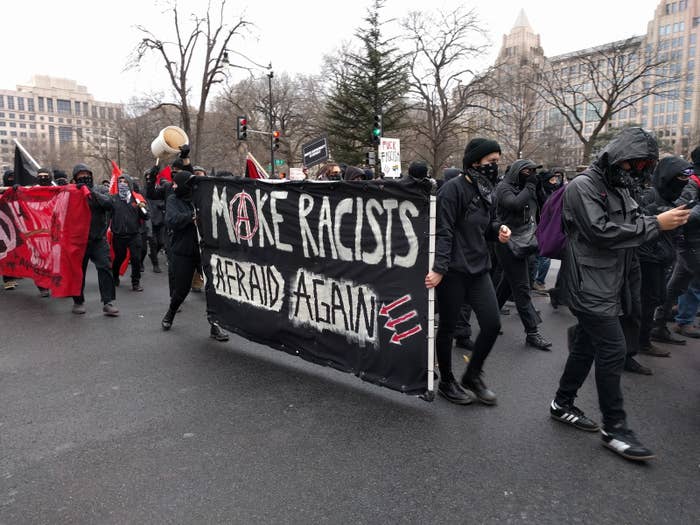
In the next round of trials against people charged with rioting during President Donald Trump's inauguration, federal prosecutors want to put a witness on the stand under an alias who spent two years undercover with "an anarchist extremist group" in New York.
Prosecutors said in court papers filed March 2 that the witness, referred to as "Julie McMahon," is no longer working undercover, but they warned that revealing her identity could jeopardize ongoing "covert operations" and also put her security at risk. McMahon will testify about the use of the "black bloc" tactic during protests on Jan. 20, 2017, according to the government.
There are 59 people still facing criminal charges in connection with the mass arrests in Washington, DC, during anti-Trump demonstrations on Inauguration Day. Following the full acquittal last year of the first six defendants to go to trial, the US attorney's office announced in January that it would drop charges against 129 of the 188 remaining defendants.
The prosecution told the court at the time that it planned to focus its efforts on defendants who allegedly engaged in "identifiable acts of destruction, violence, or other assaultive conduct," participated in planning violence and destruction, or who knowingly participated in what's known as "black bloc" tactics in order to aid violence and destruction.
The next trial is scheduled to begin on March 26, although four of the five defendants have asked to delay the trial for various reasons, including personal conflicts and difficulties going through all of the evidence in time. The government is opposing the request.
The government plans to call "Julie McMahon" to testify about the "black bloc" tactic, according to its latest filing. A black bloc is commonly described as a group of protesters who wear all black clothing, along with black masks or other gear that makes it harder to identify them as individuals. The government's theory in the Inauguration Day cases is that the defendants conspired to participate in a black bloc to make harder for police to identify individuals who engaged in violence and property destruction.
The government has said the Jan. 20 demonstrations caused more than $100,000 in property damage across downtown Washington. Throughout the protests, individuals would run out, break the windows of stores and cars, and then rejoin the crowd. Most of the remaining 59 defendants face at least eight criminal counts — one felony count of inciting a riot, two misdemeanor counts of engaging in a riot and conspiracy to riot, and five felony counts of property destruction.
The government said in its latest court filing that it intends to call "Julie McMahon" to testify about how a black bloc typically works, and how she believes it was used on Jan. 20, including the clothing demonstrators wore, objects that were later found on the scene — including crowbars and other weapons — and the use of "marshals, scouts, and medics."
"Ms. McMahon will further opine that, in her training and experience, the 'black bloc' tactic is only used when individuals within the group intend to engage in acts of violence and destruction, and that the 'black bloc' tactic is a known term within the anarchist movement," prosecutors wrote.
McMahon worked undercover — though the filing does not say for whom — infiltrating an "anarchist extremist group" in New York from 2008 to 2010 and took part in a black bloc during protests in Pittsburgh in 2008 during the G20 conference, according to the government. She was going to participate in a black bloc as part of the Occupy New York movement, but that "did not materialize as expected," prosecutors wrote.
Prosecutors said McMahon also worked undercover in public corruption and foreign counter-intelligence operations, and previously had been allowed to testify in court under an alias in criminal cases in federal court in New York.
The Confrontation Clause of the US Constitution gives defendants the right to face and cross-examine witnesses against them in court. Prosecutors said they would provide the defense with McMahon's real name and job history so they could prepare questions for her, under the condition that they not be allowed to reveal her identity to anyone else.
The government said the precautions were needed not only to protect operations that McMahon had been part of, but also to protect her — prosecutors said the lead prosecutor, Assistant US Attorney Jennifer Kerkhoff, and the lead detective had been harassed as personal information about them spread last year. According to the government, Kerkhoff received a "targeted mailing" at her home that included a picture of her with the letters "CFM" on her body, which the government said often refers to the phrase, "Come Fuck Me."
A spokesperson for the US attorney's office declined to comment. The government filed notice about its intent to introduce McMahon in the cases set for trial March 26 and April 17; defense lawyers in those cases either declined to comment or did not return requests for comment.
Dylan Petrohilos, one of the defendants in the April 17 trial group, told BuzzFeed News that the description of McMahon's work was proof of a "long-term strategy where the state has ... clamped down on civil liberties in the name of trying to go after this anarchist bogeyman."
"This is part of a long-term trend of surveillance of activists that is unfortunately becoming more and more the norm," Petrohilos said. He declined to comment on whether he would challenge allowing McMahon to testify under an alias.

